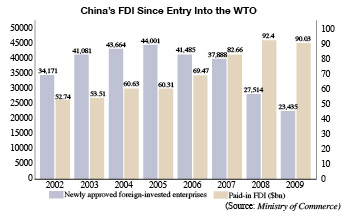|

From 1997 to July 2010, FDI in China's service sector stood at $267.9 billion, accounting for 32.4 percent of the total amount, according to MOFCOM statistics.
In recent years, foreign investors also went on an acquisition spree for Chinese companies. A total of 863 cases of mergers and acquisitions (M&As) were approved in 2009, up 1.9 percent year on year, accounting for 3.6 percent of newly approved foreign companies. Of them, 555 cases, or 64.3 percent, took place in the service sector, up 17 percent from a year earlier.
Contributions
Over the past three decades, multinational companies have become deeply interwoven into China's economy and provided enormous momentum for its fast growth.
By the end of 2009, the Chinese Government had approved the establishment of 683,000 foreign-invested enterprises, said Zhang Xiaoqiang, Vice Chairman of the National Development and Reform Commission.
In 2009, foreign-invested enterprises provided 45 million jobs. Their industrial output accounted for 28 percent of the country's total, and taxes paid were about 22.7 percent of the country's total tax revenue that year, said Zhang. Foreign-invested enterprises are also China's major exporters and their exports accounted for 55.9 percent of the country's total in 2009.
In addition, multinationals have introduced modern industrial products and technologies into China and encouraged, through their examples, Chinese companies to restructure and practice modern corporate governance, said Wang.
Also, they helped cultivate a number of industries and accelerate China's industrialization process through technology transfers, and encouraged restructuring within the country's industrial sector through frequent cross-border M&As.
M&A will become a dominant investing strategy for multinationals in China. Thanks to these M&A activities, China's industries will grow bigger and more competitive, said Wang.
Multinationals also contributed to closer economic ties between China and their home countries, and easy access for China to international resources.
But they still face a number of challenges. While some multinationals have yet to find win-win solutions for themselves and China, others need to shoulder more social responsibilities, Wang said. | 